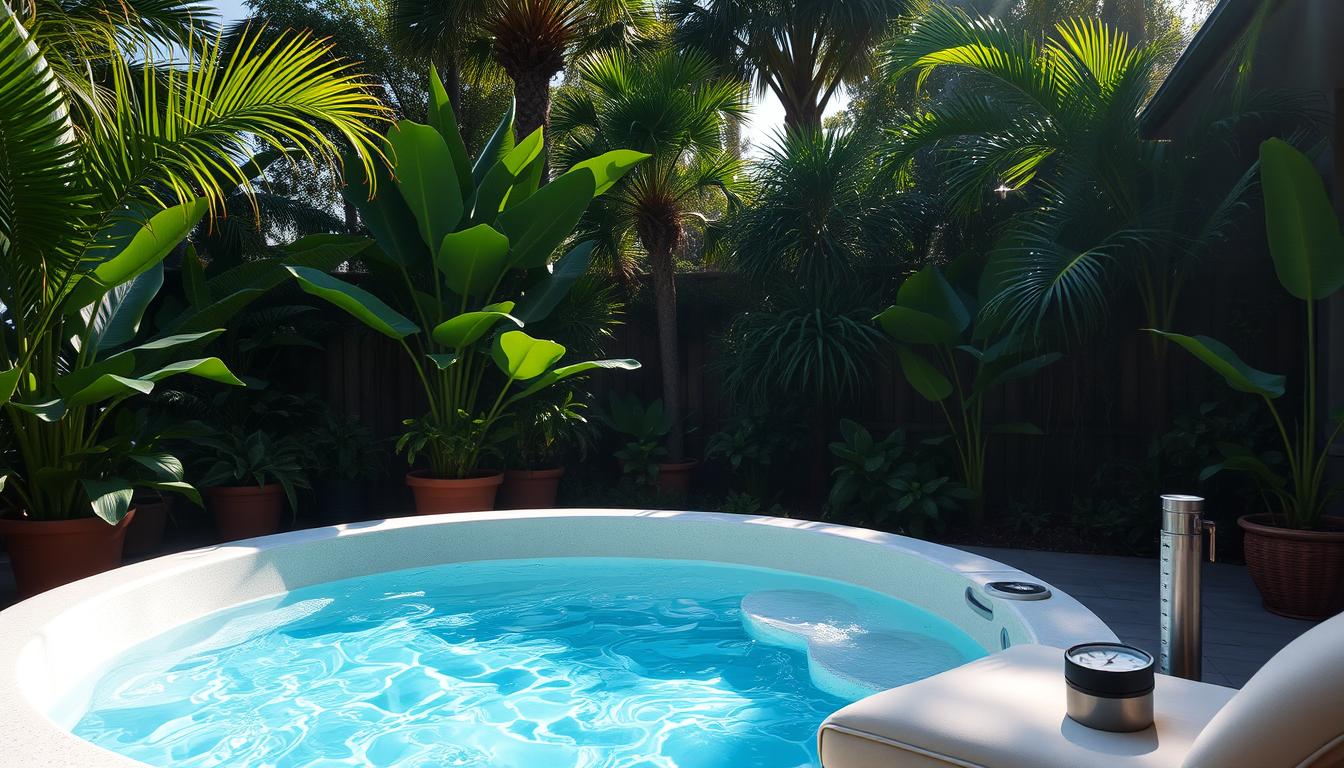
Knowing your hot tub’s water capacity is crucial for proper maintenance. It affects the amount of chemicals needed for clean, safe water. Let’s explore what determines a hot tub’s water volume.
We’ll provide information to help you calculate your spa’s water capacity. This knowledge ensures proper chemical balance and a safe soaking experience.
A standard 4-6 person hot tub typically holds about 375 gallons of water. This can vary up to 600 gallons depending on the model and size.
Swim spas have a larger capacity. Smaller models hold around 1450 gallons. Larger, family-sized spas can contain approximately 2500 gallons.
Accurate water volume estimation prevents over or under-treating the water. This helps avoid issues like cloudy water, unpleasant odors, or skin irritation.
Key Takeaways
- Hot tub water capacity varies based on size, shape, and interior features
- A 4-6 person hot tub typically holds 375-600 gallons of water
- Swim spas can range from 1450-2500 gallons, depending on the model
- Knowing your hot tub’s water volume is essential for proper maintenance and water treatment
- Accurate water capacity estimation helps maintain the right chemical balance for a safe and enjoyable soaking experience
Factors Affecting Hot Tub Water Capacity
Several factors determine a hot tub’s water capacity. These elements help us choose the right hot tub for our needs. Let’s explore the key factors influencing jacuzzi water capacity.
Hot Tub Size and Shape
Size and shape greatly affect a hot tub’s water capacity. Hot tubs range from small models for two to four people to large ones for seven or more.
The hot tub’s dimensions directly impact its water-holding capacity. Shape also plays a role in determining water capacity.
Common hot tub shapes include:
- Square
- Rectangular
- Round
- Octagonal
Rectangular hot tubs are popular for their space-efficient design. They fit well in narrow spaces or against walls. Different shapes require unique formulas to calculate water volume.
Interior Features and Displacement
Interior features like seats, loungers, and jets affect hot tub water capacity. These elements displace water, reducing the overall volume a hot tub can hold.
In-ground, soft, and wooden hot tubs typically have fewer water-displacing features. This impacts their water capacity calculations compared to portable acrylic models.
Did you know that a standard 6-person acrylic hot tub can weigh around 5,453 pounds when filled with water and occupied? That’s equivalent to the weight of a full-grown African elephant!
When estimating water capacity, consider displacement caused by interior features. The fill-time method is more accurate than the dimensional method for measuring capacity.
Fill Level and Optimal Water Volume
The fill level of a hot tub affects its water capacity. Maintaining the right water volume ensures proper functioning and balanced water chemistry.
Overfilling or underfilling can cause problems with filtration, heating efficiency, and overall performance. Check the owner’s manual for the recommended water level.
| Hot Tub Size | Seating Capacity | Average Water Capacity |
|---|---|---|
| Small | 2-4 people | 200-300 gallons |
| Medium | 4-6 people | 300-400 gallons |
| Large | 7+ people | 500+ gallons |
Understanding these factors helps us choose the right hot tub. Ensuring proper water capacity is crucial for a comfortable soaking experience.
how much water does a hot tub hold
Hot tub water capacity varies based on size, shape, and interior features. Several methods can accurately calculate the volume. Let’s explore effective ways to estimate a hot tub’s water capacity.
Calculating Water Volume by Fill Time
The fill time method is highly accurate for calculating water volume. Time how long it takes to fill the hot tub and a bucket. Use the same hose and water pressure for both.
Divide the hot tub fill time by the bucket fill time. This gives you the approximate water volume in gallons.
Estimating Capacity Using Dimensional Method
The dimensional method estimates hot tub capacity using measurements. Measure the length, width, and average water depth in inches or meters. Apply specific formulas based on the tub’s shape.
For square or rectangular tubs, use this formula: Length x Width x Average Water Depth x 0.00427 = Volume in Gallons. Round or multi-sided tubs use a slightly different formula: Length x Width x Average Water Depth x 0.00335 = Volume in Gallons.
Average Water Capacity by Hot Tub Size
General guidelines exist for average water capacities based on tub size. These can vary depending on specific dimensions and features.
| Hot Tub Size | Average Water Capacity |
|---|---|
| Two-person | 170-200 gallons |
| Three-person | 300-400 gallons |
| Four-person | 350-500 gallons |
| Five-person | 400-600 gallons |
| Six-person | 450-600 gallons |
These methods help determine a hot tub’s water capacity. This knowledge is crucial for proper maintenance and chemical balancing. It also aids in ensuring energy efficiency.
Understanding your hot tub’s water capacity helps meet its requirements. This ensures you provide appropriate care to keep it functioning optimally.
Conclusion
Knowing your hot tub’s water capacity is key for top-notch water quality. It ensures a perfect soak every time. Standard 6-person tubs hold 320 to 475 gallons, while swim spas pack even more.
You can measure capacity using the fill time or dimensional method. For accuracy, check the manufacturer’s specs. Usage, bathers, and maintenance affect water change frequency. Most owners should change water every 3 to 4 months.
Regular cleaning and proper chemical use keep your tub in top shape. Test and balance pH, alkalinity, and sanitizer levels often. This prevents bacteria and algae growth, keeping water safe and clear.
Don’t forget about plumbing maintenance. It prevents clogs from biofilm and debris. This keeps water flowing smoothly in your spa.
A consistent maintenance routine extends your hot tub’s life. It also ensures a clean, safe soak for years to come. With proper care, you’ll always enjoy your spa experience.







